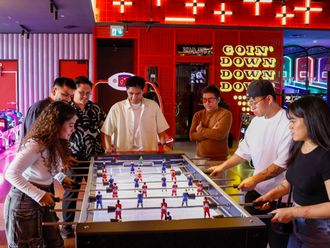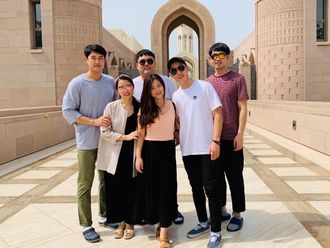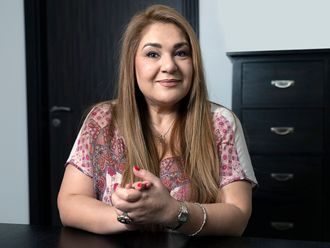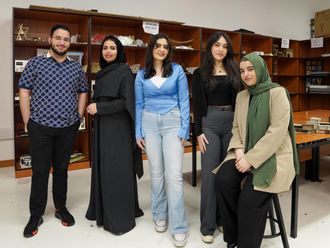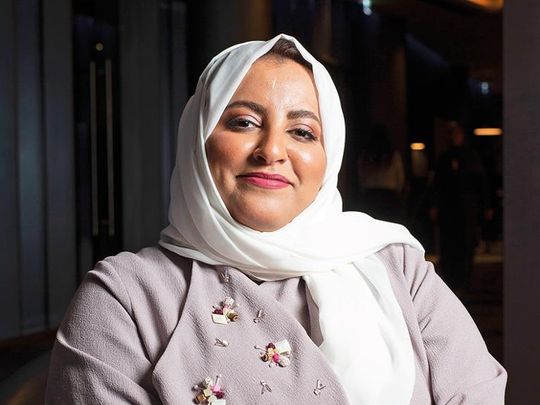
Think trailblazing scientists and Isaac Newton, Albert Einstein and Stephen Hawking spring to mind immediately. How often does Polish-French scientist Marie Curie make that list? The sad truth is, rarely. It’s this narrative the L’Oreal-Unesco For Women in Science programme is trying to change since 1998. ‘The initiative has supported over 3,200 women, rewarded 107 laureates (three have since won Nobel Prizes), granted fellowships in 118 countries till date,’ says Remi Chadapaux, managing director of L’Oreal Middle East. The Middle East Fellowship, now in its sixth year, has been putting female Arab scientists on the global map.
This article is part of series where we speak to three current fellows (announced in November) and three past ones of the Middle East Fellowship.
Also in this series:
- Modern game changers: molecular biologist Wafaa Ramadan
- Modern game changers: Dr Habiba AlSafar, pioneer in genetics
- Modern game changers: Dr Saba Al Heialy, uncovering links between obesity and asthma
- Modern game changers: Dr Maha Al Mozaini, overcoming cultural taboo in HIV research
- Modern game changers: Dr Fatma Al Ma’Mari, experimental physicist
Dr Wafa Audah Altalhi, post-doctoral researcher, Harvard University, Boston and Taif University, KSA, and present recipient of L’Oreal-Unesco For Women in Science Fellowship
Organs ready to be picked off shelves and transplanted into patients might sound like a scene from a sci-fi movie.
‘It’s reality and it’s actually happening every day in labs in Japan and the US,’ says Dr Wafa Audah Altalhi. It’s in one such lab at Harvard University that the post-doctoral researcher from Saudi Arabia is conducting her futuristic research project that aims to create bio-engineered organs.
That means, critically ill patients don’t have to wait on long donor lists until a match is available, living donors’ health risks are avoided, hospital expenses are reduced... It also might spell the end of organ trafficking and black-market organ donations.
It’s a research project that’s brimming with potential, which is why it deservingly won a grant of around Dh80,000 in the Postdoctorate Researchers category of the L’Oreal-Unesco 2019 For Women in Science Fellowship.
‘Most scientists regardless of whether they agree or not have a personal motivation behind becoming a scientist and their interest in a specific field and the same goes for me,’ Wafa confesses. Coming from a family that’s afflicted by diabetes, Wafa was always curious to study about ways to overcome the effects of the disease. ‘I ended up in a lab where they studied the effect of diabetes on blood vessels. This caught my attention.’ She then went on to study the effect of diabetes on the three stages of blood vessel growth for her PhD, and is now focusing on organ bio-engineering in her post-doctoral research.
How far away are we from the day that donor-less organs become a reality, I ask.
Approximately 50 years before we can even think of clinical experiments, Wafa quips. ‘That too provided we progress technologically at the same rate. But so many giant leaps are being made in the field you never know,’ she adds.
Just because readymade lungs and kidneys are a distant dream doesn’t mean Wafa’s research hasn’t made some remarkable strides. The field of bio-engineering has identified specific cells – pluripotent stem cells – that can easily be procured from a person’s fibroplast found in their skin. These cells, says Wafa, can then be programmed to behave like embryonic cells and then be forced to become cells of whatever organs the researchers are interested in developing.
As of now, Wafa’s focus is on bioengineering these pluripotent cells into blood vessels that can be used to replace damaged vessels in myocardial infraction (heart attack) patients. Traditionally in bypasses, extra cuts and surgeries are inflicted on patients for grafts of the saphenous vein from their leg, which is used to replace damaged arteries.
As is the nature of research, Wafa faces innumerable challenges daily, from ensuring the safety of the cells they produce, ‘that don’t create any tumour cells as they’re genetically modified’, to their functionality – ‘we need to ensure they’re viable and stable.’ But these are just minute setbacks and what keeps Wafa going is the pride she sees in her dad’s eyes. ‘He’s been my number one support and his hope in us has helped us take the risks to believe in ourselves.’ The result? Four of her five sisters are scientists like her.
She attributes it to being raised on equal footing with her six brothers. Whenever the government launched scholarships, such as The Custodian of the two Holy Mosques’ overseas scholarship programme, all the Altalhi siblings, boys and girls, were encouraged to try their luck. ‘Luckily, my progressive family sent me. But other girls who had [accomplished] the same things as I had but were denied this opportunity fell way behind in life.’
Such incidents drill home the importance of fellowships like L’Oreal-Unesco for Wafa. ‘It gives us exposure on an international level, and encourages us to talk about and communicate our work to people of different understanding, like I’m doing with this interview.’
Then there is the monetary bounty of the grant, which will help her transfer all the knowledge and machinery associated with her project in the US to Taif University, and is one of the main reasons that compelled Wafa to apply. ‘It increases awareness that more innovation needs more money.’




